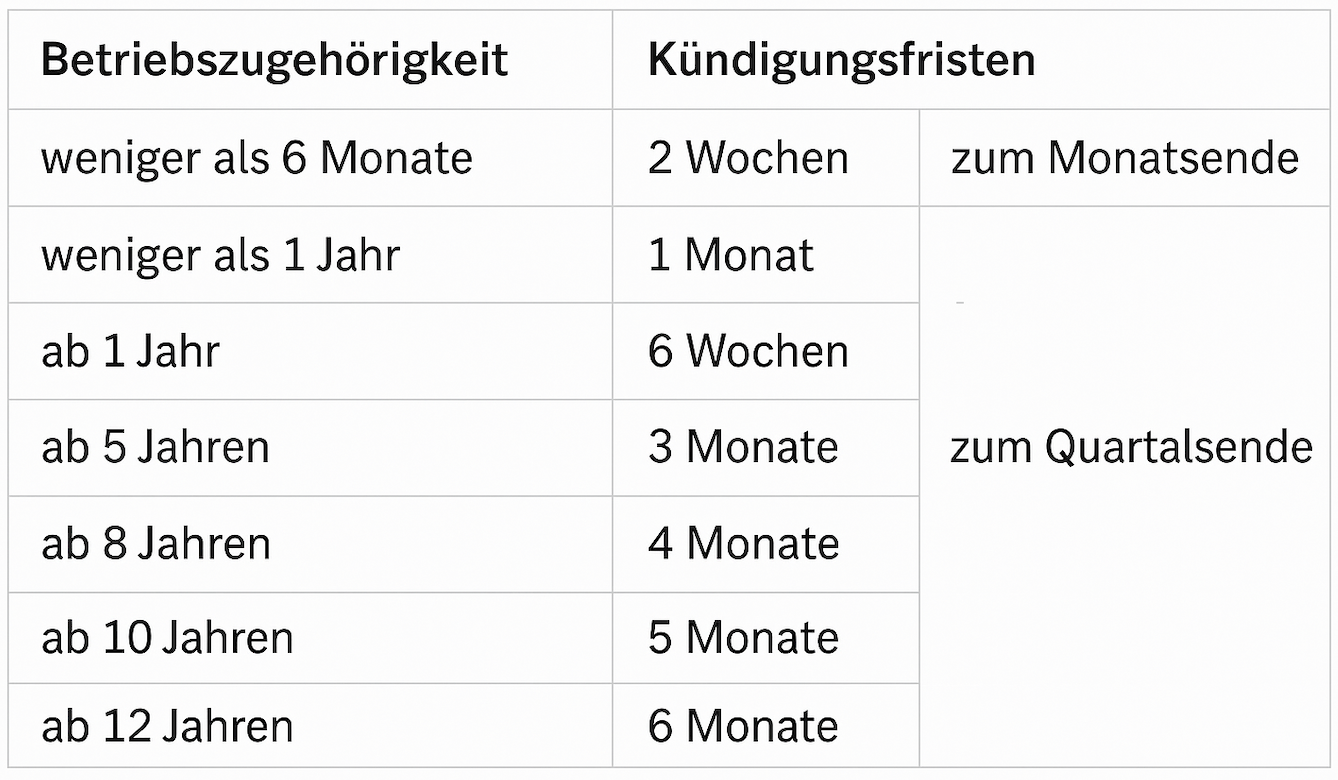

Employees in the public sector face different rules compared to the private sector, especially when it comes to notice periods, dismissal protection, and severance. Whether you work under the “TVöD” or the “TV-L”, your rights depend on a mix of general labour law and special collective agreements. This guide explains the key differences, who is protected, when a dismissal is (in)valid, and how to improve your chances of keeping your job – or negotiating a fair severance package.
Calculate your severance payment
Calculate the settlement amount for your individual case in 2 minutes
Key takeaways
- Public sector employees are protected by the Dismissal Protection Act, just like private-sector workers, but additional rules from TVöD/TV-L apply.
- Ordinary dismissal can be excluded: In the “West” tariff area, employees aged 40+ with 15+ years of service cannot be terminated ordinarily under TVöD.
- Longer notice periods apply than in the private sector, depending on length of service.
- Severance is negotiable, but there is no automatic right except in rare statutory cases (e.g., § 1a KSchG).
- Personnel council (Personalrat) must be involved – a dismissal can be invalid if they were not properly consulted.
Content
Dismissal protection in the public sector
Employees (i.e., not Beamte) in the public sector sign a private-law employment contract. That means normal German labour law applies first – and the special public-sector rules apply on top.
The public sector includes employees of the federal government, the Länder and the municipalities. The term “Beschäftigte” refers only to employees. Life-time public servants (Beamte), judges and soldiers follow separate laws.
Dismissal Protection Act still applies
If you work in a workplace with more than 10 employees and have been employed more than 6 months, you are protected by the Protection Against Dismissal Act (KSchG). This means the employer may only dismiss you for personal, behavioural, or operational reasons.
Like in the private sector, you must file a dismissal protection claim (Kündigungsschutzklage) within 3 weeks of receiving the notice.
Extraordinary (summary) dismissal
A summary dismissal without notice is only possible in cases of serious misconduct and requires a strict legal test (§ 626 BGB). Courts overturn many public-sector summary dismissals because the threshold is high.
Special protection groups
Pregnant employees, people with severe disabilities, employees on parental leave, etc., are protected just as in the private sector.

Calculate severance pay now free of charge
- Calculate potential severance payment amount
- Strategy for negotiating a fair severance payment
- Find suitable lawyers for labour law
Special rules in the collective agreements (TVöD / TV-L)
Most public-sector employment relationships are governed by either:
- TVöD (federal and municipal sector)
- TV-L (Länder, except Hessen)
Both agreements contain nearly identical rules on dismissal.
Who is covered?
TVöD / TV-L generally apply to employees who are not life-time public servants (Beamte).
They do not apply to e.g.:
- senior executives (leitende Angestellte under § 5 BetrVG)
- chief physicians (Chefärzte)
- university research staff
- foreign local hires (“Ortskräfte”)
- Life-time public servants (Beamte), judges, soldiers
Sometimes the contract explicitly extends or excludes TVöD/TV-L – always check the written agreement.
No ordinary dismissal after long service
Under § 34 (2) TVöD/TV-L, employees who:
- are over 40, and
- have 15+ years of service, and
- work in the TVöD-West tariff area
can no longer be dismissed ordinarily. Only a termination without notice is still possible – in theory. In practice, courts often overturn such dismissals because the employer must prove an extreme case. Unlike in the private sector, the court cannot downgrade a failed summary dismissal into an ordinary one – because ordinary termination is excluded completely. The result: The dismissal becomes fully invalid.
Calculate your severance payment
Calculate the settlement amount for your individual case in 2 minutes
Notice periods in the public sector
Public-sector notice periods are longer than in the private sector. They are regulated in § 34 TVöD/TV-L and depend on length of service. The first year allows termination at month-end; afterward, periods increase step-by-step, often to quarter-end.

Fixed-term contracts follow different rules under § 30 TVöD/TV-L.
How service time is calculated
Under § 34 (3) TVöD:
- All employment periods with the same employer count.
- Legal interruptions do not count – but parental leave and maternity leave do, because the contract continues.
- Approved special leave may count as service time.
- A switch to another public-sector employer normally transfers accrued service time.
Role of the personnel council (Personalrat)
Unlike the private sector (Betriebsrat), the public sector has a Personalrat.
In federal employment, a dismissal is invalid if the personnel council was not involved (§ 85 (3) BPersVG).
Länder have similar but not identical rules – legal advice is recommended.
If the employee files a lawsuit, the employer must – upon request – continue employing them under unchanged conditions after the notice period until the case is resolved (§ 85 (2) BPersVG).

Calculate severance pay now free of charge
- Calculate potential severance payment amount
- Strategy for negotiating a fair severance payment
- Find suitable lawyers for labour law
Severance in the public sector
Public employees do not have an automatic right to severance. A statutory right (½ month per year) exists only in rare cases under § 1a KSchG.
Otherwise, severance is:
- negotiated voluntarily, often in a settlement or termination agreement,
- sometimes granted via a social plan negotiated with the personnel council,
- typically 0.5–1.0 monthly salaries per year of service, but varies by case strength.
Because dismissals are often weak, public employers frequently offer severance to avoid long trials.
Frequently asked questions (FAQ)

Free initial consultation with a specialist lawyer
- Free initial consultation with a lawyer
- Quick callback after 1 to 2 hours
- Strategy for negotiating the severance pay




